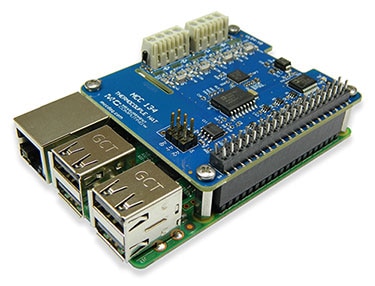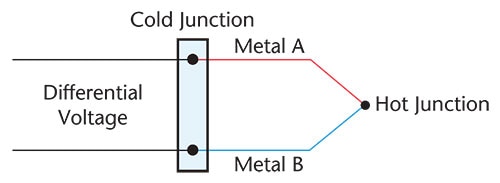
When it comes to temperature measurement, thermocouples stand out as a favored solution owing to their affordability, simplicity, and expansive measurement range. In this article, we'll explain the intricacies of accurate thermocouple measurements, the innovative approach of the Digilent MCC 134 DAQ HAT in tackling these challenges, and how users can optimize their measurements to minimize errors.
Understanding Thermocouples: How They Operate
Thermocouples function by harnessing the Seebeck effect, where thermal gradients generate electrical potential differences. Typically consisting of two wires made of dissimilar metals joined at one end to form a junction, thermocouples produce a voltage in response to temperature variations, facilitating temperature measurement.
Various thermocouple types utilize different metal combinations, catering to distinct temperature ranges. For instance, J type thermocouples, crafted from iron and constantan, excel in measuring temperatures ranging from -210 °C to 1200 °C, while T type thermocouples, employing copper and constantan, are ideal for measurements spanning from -270 °C to 400 °C.
The challenge lies in accurately measuring the temperature difference between the hot (measurement) and cold (reference) junctions, which necessitates precise assessment of the cold junction temperature.
Navigating Thermocouple Measurement Fundamentals
Thermocouples generate a voltage relative to the temperature gradient between the hot and cold junctions. However, determining the absolute temperature of the hot junction requires knowledge of the absolute temperature of the cold junction.
Traditionally, ice baths served as reference points for the cold junction temperature. However, modern measurement devices incorporate sensors to gauge the terminal block's temperature, where thermocouples connect to the measurement apparatus.

Identifying Sources of Thermocouple Errors
Numerous factors contribute to thermocouple measurement errors, including noise, linearity, offset error, the thermocouple itself, and the measurement of the cold junction temperature. While advanced 24-bit measurement devices leverage high-accuracy ADCs and design strategies to minimize errors, thermocouple imperfections remain inevitable.
Addressing Design Challenges of the MCC 134 DAQ HAT
The MCC 134 encounters distinctive design hurdles in ensuring accurate temperature measurements. The MCC 134 faces uncertainties due to temperature gradients induced by external factors like the Raspberry Pi and ambient conditions.
To mitigate inaccuracies, Digilent redesigned the MCC 134 with an enhanced scheme featuring two terminal blocks and three thermistors strategically positioned to track cold junction temperature variations effectively.
Optimizing Thermocouple Measurements with Digilent’s MCC 134
To maximize the accuracy of thermocouple readings using the MCC 134, users should adhere to certain best practices:
- Minimize Raspberry Pi processor load to prevent temperature elevation.
- Avoid environmental temperature fluctuations that can introduce errors.
- Ensure steady airflow for heat dissipation and error reduction.
- Position the MCC 134 farther from the Raspberry Pi within a stack of HATs to enhance accuracy.
In Conclusion
Despite the inherent complexities of thermocouple measurements, the MCC 134 stands as a testament to innovative design and rigorous testing, offering a reliable solution for leveraging standard thermocouples with the Raspberry Pi platform.
